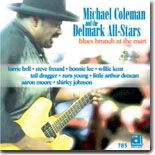 The Chicago Blues Festival is the largest
free blues festival in the world. However, it hasn’t featured many
Chicago blues cats lately. You are guaranteed to find them at the
Delmark Records and Jazz Record Mart Blues Brunch. On the final morning
of the four-day festival, the annual brunch is attended by die-hard
fans, disc jockeys, festival promoters, photographers, journalists, and
other blues industry personnel from around the globe. On the menu is
more than continental breakfast. The main entree is a free concert
featuring an all-star lineup of Delmark’s leading blues artists. For
posterity, the 2005 edition was filmed and recorded to be released on
DVD. The DVD release was aborted since Delmark was not pleased with its quality.
The Chicago Blues Festival is the largest
free blues festival in the world. However, it hasn’t featured many
Chicago blues cats lately. You are guaranteed to find them at the
Delmark Records and Jazz Record Mart Blues Brunch. On the final morning
of the four-day festival, the annual brunch is attended by die-hard
fans, disc jockeys, festival promoters, photographers, journalists, and
other blues industry personnel from around the globe. On the menu is
more than continental breakfast. The main entree is a free concert
featuring an all-star lineup of Delmark’s leading blues artists. For
posterity, the 2005 edition was filmed and recorded to be released on
DVD. The DVD release was aborted since Delmark was not pleased with its quality.
The CD release, Blues Brunch At The
Mart, features one of Chicago’s most notoriously
under-rated guitarists, Michael Coleman, known best for his 1980s
tenure with James Cotton. Here, Coleman and his Backbreakers act as
house band for this remarkable event. Bobby Sellers (drums) and Dave
Wood (bass) support the All-Stars with stateliness while John Chorney
delivers supreme keyboard fills throughout. Take note of Coleman’s
undeniably dapper guitar work on "The Sky Is Crying" and "You’re
Going To Miss Me." Although he was out gigging into the wee wee
hours, Coleman is in top form. With each note emitting excitement, the
booty-shaking latter features passionate guitar playing which is lacking
among Chicago’s younger blues gunners. If you think Chicago blues is
stagnating, let this brilliant underdog transform you.
Lurrie Bell was the great phoenix of the
2005 Chicago Blues Festival. His appearance at the brunch was a special
treat. Listen to the blues drip off his frets on "I Need You So Bad"
and "Reconsider Baby." "Something New" may be beloved Willie
Kent’s final recording. His blues are rough and raw, but his supple
voice reveals his gentleness. His passing was a great loss to the blues
world. Fittingly, the CD has been dedicated to him.
Steve Freund doesn’t
provide stunning vocals, but his guitar playing is phenomenal on a
couple of songs. By the time Little Arthur Duncan finishes "Knockin’
On Your Door," he is a sweaty mess. In person, Taildragger sounds
even more like Howlin’ Wolf on "Be Careful."
Via substantial
support Delmark has championed the careers of the city’s blues women.
The three featured here bring out Coleman’s best playing. Blues belter
Bonnie Lee makes her voice waver on "Sad & Evil Woman." By
contrast, Zora Young’s delivery is deeper and sadder on "Toxic." "As The Years Go Passing By" has been covered many times, but Shirley
Johnson presents one of the best versions by using intense and genuine
vocals.
For 60 minutes, you hear authentic,
gut-bucket Chicago blues in their natural habitat. It’s not the
fabricated stuff that the tourists go for. As good as the music is the
CD doesn’t capture the camaraderie that transpires among the fans and
artists at this intimate event. So do yourself a favor. Attend next
year’s brunch in person.
--- Tim Holek
Freelance Journalist
www.timholekblues.ca
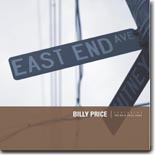 Pittsburgh, PA's Billy Price has long been one of the more
popular blue-eyed soul singers on the East Coast circuit, delivering
high quality soulful blues every time out. His latest disc, East End
Avenue (Bonedog Records), Price's first album of new material in
seven years, is no exception. As the legion of Billy Price fans has come
to expect, this disc features Price's wonderful vocals backed by a tight
band with plenty of horns.
Pittsburgh, PA's Billy Price has long been one of the more
popular blue-eyed soul singers on the East Coast circuit, delivering
high quality soulful blues every time out. His latest disc, East End
Avenue (Bonedog Records), Price's first album of new material in
seven years, is no exception. As the legion of Billy Price fans has come
to expect, this disc features Price's wonderful vocals backed by a tight
band with plenty of horns.
The CD opens with one of five band originals, the soulful blues shuffle
of "Keep It To Yourself" which blasts the listener out of their seat
right from the start. Price always has a strong blues guitar player in
his band, and here we get to hear some nasty slide work from Lenny
Smith. Pittsburgh songwriter Mike Sweeney contributes six
compositions to East End Avenue, with one of the highlights being
the funky number "She Left Me With These Blues," which again showcases
Smith's strong playing.
Price's music has long appealed to the beach music crowd found primarily
throughout the Carolinas. The title cut, which has a bit of a Drifters
sound, has that beach music groove and features nice work from sax
players Eric DeFade and Rick Matt.
The mournful blues of "The Other Side of You" could easily have come
from the Robert Cray songbook, but is another original co-written by
Price and Jon Tiven. Here, the singer tells how he hopes to salvage a
failing relationship. The mood shifts completely on the next cut written
by keyboardist Jimmy Britton, "If You Cook Like You Walk," which
captures a real New Orleans vibe that one could easily imagine Dr. John
covering. Britton is the real star on this cut with nice gospel-flavored
piano.
Britton again proves to be one of the unsung heroes of East End Avenue
with his tasteful accompaniment, both piano and organ, on the slow Ray
Charles-ish song "The Price I Paid for Loving You." Price delivers some
of his most impassioned vocal work here.
The whole band gets extra funky on the tribute to legendary soul singer
Arlester "Dyke" Christian, leader of the the influential band Dyke & the
Blazers, calling him the "father of funk" and also mentioning various
singers (such as James Brown) that were influenced by Dyke. "Funky Like
Dyke, Part 2" is just a fun, 5 1/2 minute romp that ends way too soon.
East End Avenue closes with one of its strongest cuts and the
only cover on the CD --- a reworking of Dan Penn's slow, pleading soul
tune "Faithful and True." Price's pleading vocals are nicely
complimented by the work of the horn section.
Kudos to Billy Price for what he's been doing all these years. He's one
of the best at his craft and East End Avenue is a fine addition
to his catalog.
--- Bill Mitchell
 You probably figured that
William Lee Ellis couldn’t top his previous album, and, indeed,
Conqueroo did set the bar very high. However, the roots
guitarist/singer/songwriter has teamed with producer and Memphis music
legend Jim Dickinson for his latest release for Yellow Dog Records. The
result, God’s Tattoos, is another stunning piece of American music that,
like its predecessor, gets better with each subsequent listen.
You probably figured that
William Lee Ellis couldn’t top his previous album, and, indeed,
Conqueroo did set the bar very high. However, the roots
guitarist/singer/songwriter has teamed with producer and Memphis music
legend Jim Dickinson for his latest release for Yellow Dog Records. The
result, God’s Tattoos, is another stunning piece of American music that,
like its predecessor, gets better with each subsequent listen.
As on his prior releases, Ellis’ music embraces blues, gospel, folk, and
pop in usually equal measure, sometimes in the same song. This time
around, he has added rhumba to the mix with the stellar title track,
whose title refers to, as Ellis explains, “the indelible ink of
experience,” or the scars, both emotional and physical, that we
accumulate over our lifetimes. It’s a haunting track and quite different
from anything on Ellis’ previous recordings for Yellow Dog, with able
help from Dickinson on keyboards, Reba Russell on backing vocals, and
Rick Steff’s ethereal accordion.
Ellis’ love for gospel blues shines bright on most of the tracks,
including the Southern rock update of the Rev. Gary Davis standard,
“Search My Heart” (with strong vocal support by Russell and Jimmy
Davis). Ellis also pays tribute to Davis with the impressive “Jesus
Stole My Heart.” “Four Horses” is an Apocalyptic narrative with some
rousing slide guitar, and on a tender reworking of the Mississippi John
Hurt tune, “Here Am I, Lord Send Me,” Ellis is assisted by his wife,
Julie Coffey, on backing vocals. In the liner notes, Ellis claims two of
the tracks came to him in dreams, one being the Davis tribute, the other
being “Cold and Weary,” a solemn track in recognition of the homeless.
On “Perfect Ones Who Break,” Ellis ventures more toward a pop vein with
satisfying results. “The Call,” written in the wake of 9/11, features
Ellis’ slide guitar and soulful vocal support from the Memphis group,
the Masqueraders. There are also two instrumentals that further showcase
Ellis’ guitar proficiency. On the fascinating “When Leadbelly Walked the
River Like Christ,” Ellis plays his acoustic guitar with an E-bow. The
second instrumental, “The Missing Moon and Stars,” is more traditional,
with Andy Cohen’s dolceola complementing Ellis’ guitar beautifully.
Amy LaVere (bass) and Paul Taylor (drums) provide superlative backing
and Dickinson’s production is, as expected, outstanding.
William Lee Ellis is fast distinguishing himself as not only a master
guitarist, but also a gifted songwriter. God’s Tattoos is an exceptional
release that will appeal to fans of all music genres, most especially
blues and roots music fans.
--- Graham Clarke
Since the 1970’s, Iowa native
Bo Ramsey has carved out a niche as a performer, producer, and
guitarist. He has collaborated with folksinger Greg Brown over the past
15 years, producing and/or playing guitar on ten of Brown’s CDs. He’s
also produced discs by Teddy Morgan, Dave Zollo, and Pieta Brown, but
he’s probably best known for his stint with alt-country star Lucinda
Williams, co-producing her Grammy-nominated Essence and touring with her
in support. In addition, Ramsey has released several discs under his own
name.
Ramsey’s latest CD is a collection of some of his
favorite blues songs. That being said, Stranger Blues (Bo Ramsey
Records), is probably
unlike anything you’ve heard in a while. Ramsey, who has been called the
“Daniel Lanois of the Plains,” produced the disc, and the result is a
sparse, atmospheric feel that does remind you of the Lanois-produced
albums of the late ’80s/early ’90s.
The set list is pretty familiar to most blues fans, but Ramsey doesn’t
present them as you’ve heard them time and time again over the years.
Ramsey’s guitar work is very diverse, obviously due to his time as a
session guitarist over the years, and rarely sounds the same from track
to track. In addition, his gravelly vocals are ideal for the material.
In a lot of ways, his style will remind you of J. J. Cale, another
Midwesterner.
The mood and tone of the songs also varies quite a bit throughout the
disc. The title track, an Elmore James number, with its funky setting
and percolating keyboards is a great opener. The tempo of “Sitting On
Top Of The World” is slowed almost to a halt. Where the original version
by the Mississippi Sheiks conveys a sense of relief that the woman’s
gone, Ramsey’s mournful guitar and vocals convey an almost unfathomable
sense of loss. The next cut, Jessie Mae Hemphill’s “Jump Baby Jump,”
serves as a welcome respite with its hill country rhythm and Ramsey’s
playful vocal, and “Crazy Mixed Up World” settles into a jazzy groove
that fits the song well.
Other standout tracks include the cover of Jimmy Reed’s “You Got Me
Dizzy,” which is pretty faithful to the original, with Ramsey emulating
Reed’s nasally vocal style perfectly as well as Reed’s familiar style,
and “No Place To Go” (better known as Howlin’ Wolf’s “How Many More
Years”), which wisely sticks to the beat of the Wolf’s original, and the
closing track, a meditative take on the gospel number “Where The Sun
Never Goes Down.”
In addition to Pieta Brown (who co-produced the disc), Ramsey gets
plenty of assistance from his friends, which include Greg Brown, David
Zollo, and Ricky Peterson, whose keyboards are a highlight of the disc.
Ramsey’s sons Benson and Alex also are on hand to help out.
Stranger Blues was obviously a labor of love for Bo Ramsey and is
definitely a disc that blues fans will enjoy. It’s available at Ramsey’s
website, or at
www.cdbaby.com.
--- Graham Clarke
 For years, Bernard Allison
was mostly identified as “Luther Allison’s son,” which was actually not
a bad deal in the beginning. It was hardly a fair label though because,
while the younger Allison definitely shows the influence of the elder
Allison, he’s very much his own man, augmenting the blues, soul, and
rock roots his father fused so successfully with some heavy funk as
well, both on guitar and on his vocals. In recent years, Allison has
effectively shaken that label and has emerged as a favorite of many
blues fans.
For years, Bernard Allison
was mostly identified as “Luther Allison’s son,” which was actually not
a bad deal in the beginning. It was hardly a fair label though because,
while the younger Allison definitely shows the influence of the elder
Allison, he’s very much his own man, augmenting the blues, soul, and
rock roots his father fused so successfully with some heavy funk as
well, both on guitar and on his vocals. In recent years, Allison has
effectively shaken that label and has emerged as a favorite of many
blues fans.
Last year, after a stint with the Tone-Cool label, Allison returned to
the Ruf Records label, home of some of his best previous efforts. His
latest release, the aptly-titled Energized-Live In Europe, is a
two-CD set that captures his stage show (a DVD of this appearance was
also released) recorded at the Musa in Germany in October, 2005.
Allison’s own material is more in the soul or funk vein than blues, such
as “The Way Love Was Meant To Be,” “Too Cool,” and his touching song
about his dad’s passing, “Don’t Be Confused,” but his guitar work
injects a healthy dose of the blues into these songs. He also covers
several of his father’s tunes, including “Bad Love,” which is always a
crowd favorite, “Into My Life,” “Too Many Women,” and “A Change Must
Come,” one of his best compositions, successfully.
Among Bernard’s other compositions are a diverse group of instrumentals.
The opening cut, “Another Ride To The City,” rocks hard. The second disc
starts off with a slide guitar trilogy featuring “The Walk” (slide
guitar with the Diddley Beat), “Step Down," which is basically the
“Amazing Grace” melody, “Talking Guitar,” which is a slide-infused
take of “When The Saints Go Marching In” that also mixes the talking
guitar bit that Luther used to feature in his music, and the
self-explanatory “Wah Wah Action.”
Allison also shows a deft hand with his selection of covers, which
include a high-powered take on Anders Osborne’s “Snake Bit Again,” and
the closer, Colin James’ “I just Came Back To Say Goodbye,” a highlight
from his Across the Water CD, was a great choice for a closing tune.
Throughout the disc, Allison’s guitar work is top notch. His versatility
on guitar only adds to the enjoyment of this disc. His vocals, which
have a funky ’70s era “Sugar” Bonner quality to them at times, are
strong as well, and his band (Mike Vlahakis-keyboards, Jassen
Wilber-bass, and Andrew Thomas-drums) provides solid backing.
Energized-Live In Europe should solidify Bernard Allison’s place as one
of the top blues guitarist playing today and one of the best live
performers as well.
--- Graham Clarke
Recently, Eagle Rock
Entertainment began releasing DVD’s of performances from the annual
Montreux Festivals. Nearly 30 of the DVD’s have been issued so far,
along with accompanying CDs for a few of them. One of the sets that
will interest blues fans is of a 1986 performance by Otis Rush, who was
persuaded to appear at the festival by Eric Clapton, who was one of
Rush’s biggest fans, and had recorded several of his songs.
Entitled Otis Rush & Friends Live At Montreux 1986, this DVD
features a fairly inspired performance by Rush, backed by the late
Professor Eddie Lusk and his band (guitarist Anthony Palmer, bassist
Fred Barnes, and drummer Eddie Turner). While it’s not a perfect set
(there are problems with the sound and mics, and Rush flubs a few of the
lyrics along the way), Rush’s guitar work is magnificent as are his
vocals. He runs through a pretty decent selection of his standard tunes
(“Tops,” “I Wonder Why,” “Gambler’s Blues,” “Natural Ball,” “Right
Place, Wrong Time,” and a meandering version of “You Don’t Love Me”),
before being joined onstage by Clapton. Even though a couple of their
numbers together are a bit ragged at times, their take on “Double
Trouble” (a show-stopper which Clapton put to good use on his Just One
Night live set in 1980) is superb.
Capping things off is an appearance by the electrifying Luther Allison,
who leads the trio in a somewhat disheveled “Every Day I Have The Blues”
that features some pretty thrilling guitar breaks by all three. Even
though Allison is onstage for just a few minutes, he lifts the
proceedings up a few notches while he’s there. After that heady burst of
energy subsides, Rush closes the set out with a pensive “If I Had Any
Sense, I’d Go Back Home.”
The CD features the same show, minus four of the songs (three of Rush’s
earlier songs and the closer). This is odd because there was room for
additional tracks on the CD and their inclusion would have made an
already entertaining CD even better for Rush fans.
While Live At Montreux 1986 may not be the quintessential Otis Rush live
set (for that, check out either of Delmark’s live sets, or Tops on Blind
Pig), it’s a pretty solid set that fans of Rush, Allison, or Clapton
will definitely enjoy.
--- Graham Clarke
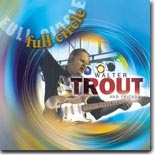 Walter Trout has logged an
impressive 35+ year career in the blues, as guitarist for Canned Heat,
and as a side man with John Lee Hooker and John Mayall. Over the past 17
years, Trout has led his own band and specialized in high-energy blues,
which feature his sizzling guitar and powerful vocals. The mix has been
particularly effective on all of Trout’s CD releases, particularly
during his stint with Ruf Records, and he has built a strong following
in Europe, based on his Ruf releases and his constant touring overseas.
Walter Trout has logged an
impressive 35+ year career in the blues, as guitarist for Canned Heat,
and as a side man with John Lee Hooker and John Mayall. Over the past 17
years, Trout has led his own band and specialized in high-energy blues,
which feature his sizzling guitar and powerful vocals. The mix has been
particularly effective on all of Trout’s CD releases, particularly
during his stint with Ruf Records, and he has built a strong following
in Europe, based on his Ruf releases and his constant touring overseas.
Though he has been recorded prolifically during the past few years,
Trout’s latest release for Ruf, Full Circle, is his first studio release
since 2001’s Go The Distance. What’s more, this release is actually
credited to Walter Trout & Friends, as each track features a guest
artist. It’s an impressive line-up, with artists like Mayall, Coco
Montoya, Bernard Allison, Finis Tasby, Jeff Healey, Eric Sardinas, Joe
Bonamassa, Guitar Shorty, James Harmon, Deacon Jones, and Junior Watson
on hand to contribute.
Mayall appears on two tracks, playing piano, harmonica, and sharing
vocals with Trout on the intense opener, “She Takes More Than She
Gives,” and playing guitar on the more relaxed “Highway Song.” Jeff
Healey recently resurfaced with a new CD after a long absence, so it’s
good to hear his guitar and vocals on “Workin’ Overtime.” Eric Sardinas
teams with Trout for an unplugged number, “Firehouse Mama,” that
captures the duo’s acoustic chops.
The teaming of Trout with Coco Montoya on “Who’s Listenin’ In” really
sets off sparks as well and is a highlight. Guitar Shorty also proves to
be a wise choice, as he and Trout tear into “Wrapped Around Your Finger”
with free and easy abandon. James Harman and his rhythm section get
together with Trout to make Harman’s slow burner, “A Busy Man,” a
memorable track.
Bernard Allison joins Trout for a cover of Luther Allison’s “Will It
Ever Change,” which doesn’t quite capture the passion of Luther’s
original (no surprise there….that’s a tall mountain to climb), but comes
close. Hammond B3 standout Deacon Jones also appears on two tracks
(backing Finis Tasby on “Can’t Help Falling Apart”) and on the jazzy
Erskine Hawkins instrumental “After Hours.” The other instrumental pairs
Junior Watson and Trout on the smoking “Slap Happy.”
Another standout on the disc is a hard rocking number with Trout and
twenty-something guitar wizard Joe Bonamassa. Clocking in at nearly
eight minutes, “Clouds on the Horizon” is a guitar tour-de-force as the
interplay between the two guitarists is downright exhilarating.
The final cut is a voiceover by New Jersey rock & roll DJ Larry Keene
and serves as a fond remembrance of how radio used to sound back in the
’50s and ’60s.
Trout’s band, the Radicals (Joe Pafumi – drums, Sammy Avila – Hammond
B3, Rick Knapp – bass) provide outstanding support and keep things
progressing smoothly. A lot of the songs featured on Full Circle are
first takes, with no overdubs or other “fixes.” This gives the recording
a looser, informal feel, more like a bunch of guys getting together to
jam. A superlative effort by Walter Trout & his friends, Full Circle is
a disc you’ll be spinning over and over.
--- Graham Clarke
Early in 2005, Ruf Records
chief Thomas Ruf got the bright idea to take three of his label’s young
European artists, Aynsley Lister, Erja Lyytinen, and Ian Parker, on a
road trip. All of these young musicians play musical styles that take in
several genres, but are firmly based in the blues with a modern edge, so Ruf decided a journey of musical exploration and discovery to the
American South to several sights of significance in blues history might
be an eye-opener.
The plans called for the trio to record at three different locations
during the journey: Clarksdale, MS, Memphis, and New Orleans.
Unfortunately, Hurricane Katrina’s arrival in New Orleans a week prior
to the sessions ruled out that location indefinitely, so the sessions
were recorded at Ardent Studio in Memphis and at Jimbo Mathus’ Delta
Recording Studio in Clarksdale. The results of the sessions were
collected in Pilgrimage – Mississippi to Memphis.
Of the 12 tracks (plus a fun bonus “Jam” at the end of the disc),
four were recorded in Memphis with Jim Gaines producing and the
remainder were produced at Clarksdale by the trio and Mathus. 11 of
the songs are original compositions, with roots in the blues, but
featuring some strong rock and even pop sensibilities as well.
Though in his 20s, Lister has recorded several times for Ruf and is
a strong singer and guitarist. His compositions include “1010°,” a
straight rocker, “Mississippi Lawnmower Blues,” a stripped-down Delta
blues track, and “Twinkle Toes Willie” (with some great slide guitar by
Lyytinen), which has a real Southern rock feel.
Parker, who’s also recorded previously for Ruf, is a strong songwriter,
mixing soul and pop effortlessly. His standout tracks include “All The
Time,” which has a real gospel edge to it and some soulful backing
vocals, and “Heal Me Love,” which would get some serious radio play in a
perfect world. His stinging lead guitar work is also a highlight.
Lyytinen may not be familiar to a lot of blues fans, but she is highly
regarded in Finland, where she’s known as “the Bonnie Raitt of Finland.”
She proves the title is accurate time and time again on Pilgrimage with
her outstanding slide guitar. She also contributes a versatile group of
tracks (“Last Love Song,” “Funky Mama,” and the ghostly “Dreamland
Blues”) that will leave you looking forward to her upcoming release on Ruf.
The cover of Luther Allison and James Solberg’s “You Don’t Know” is not
the rip-roaring rocker the original is, but the low key approach works
well, especially with Lyytinen’s guitar punctuating the track. The group
effort, “Blues Caravan,” is a funky romp with each singer taking a turn at
the mike. The group is currently touring as the Blues Caravan, so this
serves as a pretty good theme song.
Released with little fanfare (although it has been featured in Amazon’s
blues music section for a few weeks), Pilgrimage is a strong set with
lots of twists and turns that also remains indelibly linked to the blues
sounds of the delta region. With great songs and performances like the
ones featured here, you’ll be hearing more from Aynsley Lister, Erja
Lyytinen, and Ian Parker in the future.
--- Graham Clarke
 Contagious wildness. The Washington Post
used this term to describe their impression of Lil’ Ed & the Blues
Imperial’s music and I for one can’t think of a better way to
describe the frenetic energy that emanates from Ed’s latest release,
Rattleshake (Alligator Records).
Contagious wildness. The Washington Post
used this term to describe their impression of Lil’ Ed & the Blues
Imperial’s music and I for one can’t think of a better way to
describe the frenetic energy that emanates from Ed’s latest release,
Rattleshake (Alligator Records).
"Leaving Here" kicks off the show with a
blistering guitar barrage that lets you know Ed is in the house. It’s
time to leave town and he wants you to know he’s on his way out. “I’m
sick and tired, sick and tired, leaving here.” The good times are over,
the women have gotten old, and it’s time to move on. “I’m tired of
crying….crying over you…I’m going to take my heartache and here’s what
I’m going to do…” Ed’s had enough and its time to let loose. The only
good solution to a broken heart in ‘I’m Crying’ is more wild times and
he’s out on the town in search of new adventures. Ed’s guitar is doing
the talking and it’s letting loose a mean streak.
Ed’s luck continues to go bad in "Golden
Rule." “Now you say you don’t want me…want me hanging round….I ain't no
fool….go by the golden rule.” He moves on knowing that the bad will
served to him will eventually make its way back to the woman in
question. Things slow down on "You Just Weren’t There," the second song
on the record penned by Ed’s wife, Pam. Deeply moving with a passionate
solo by Ed, you feel the despair of a lover who is missing his soul
mate. “I tried to imagine that you cared….oh baby….you just weren’t
there.” Definitely my favorite song on an album full of choice cuts.
"Icicles in My Meatloaf" is just classic
Lil’ Ed. His new girl took him home to celebrate their relationship with
a home cooked meal….”I tell you what the table was great….I didn’t want
to rock her boat….but there were little icicles in my meatloaf.” Ed
continues to dance around the subject and decides the girl is worth the
error in her cooking. "Broken Promises" finds Ed lamenting the fact that
…”what a fool….what a fool am I….to have a good woman like you and all I
do is make you cry.” It’s obvious to Ed that if he doesn’t change his
ways he’s going to lose this good woman and yet he seems destined to
lose her.
Lil’ Ed slows things down and goes a
little bit country on his cover of Billy Joe Shaver’s, "Tramp on Your
Street." A poor man who hooks up with a wonderful woman, Ed readily
admits he’s just “a tramp on your street.” “Walked 10 miles of train
track to bring you home with me….because your body is warm and its
spirit free, you take me in your arms and you take care of me.” Very
well done, "Tramp on Your Street" is easily another favorite on this
record. "Maybe Another Time" is just a case of bad timing. Written by
Ed’s half brother, James Young, "Maybe Another Time" laments the chance
meeting with a gorgeous woman and hopes that…”maybe there’ll be another
time.” We just don’t know if it ever happens.
"Spend Some Time With Me" is the other
Young song included in the record. “We don’t do the things we used to
do….let’s get together and then you’ll see…come on baby spend some time
with me.” A nice slow passionate guitar intro brings us to Lil’ Ed’s
"Nobody’s Fault But My Own." His woman’s gone and left him all alone.
“She’s gone…gone and left me…but it’s nobody’s fault by my own.” He
treated his woman badly and she finally had no choice but to walk out on
him. “She would try…try to express herself and I wouldn’t listen to
nothing she had to say.”
‘’You Know You’re Wrong," the Elmore James
original finds Ed’s woman is up to no good. She calls his work to see if
he’s there so that she can step out on him. “You know you’re always
running….running to another man’s place.” The truth is that she’s always
looking for another man to “take your daddy’s place.” A blistering
version of "That’s the Truth, written by Ed’s uncle, J.B. Hutto,
follows, and the record closes with a Lil’ Ed original, "It’s a
Beautiful World." “It’s a beautiful world…for you and me….let’s get
together and then you’ll see.”
Rattleshake finds Lil’ Ed and the
Imperials in fine fashion. The notes from Alligator records indicate it
was recorded “old school style.” They simply went into the studio, mic’d
up everyone and let it rip. If something didn’t come out right, they
simply played the song again. Most everything was recorded in one or two
takes and the result is an infectious record that keeps you jumping and
smiling throughout. “Contagious Wildness” indeed, this is a record that
will get you out of your rocking chair and have you moving all night
long. And there’s nothing wrong with that!
--- Kyle Deibler
 Road to Rio, the latest project by
the Hollywood Blue Flames, is unique in its ability to pay homage
to the original roots of the Blue Flames, the legendary Hollywood Fats
Band, while bringing forth the vast talents of its players to a new
generation of blues fans. The result is a unique project that deserves
consideration for both the new material presented and the bonus CD of
unreleased material by the Hollywood Fats Band itself. So buckle up,
kick back and enjoy.
Road to Rio, the latest project by
the Hollywood Blue Flames, is unique in its ability to pay homage
to the original roots of the Blue Flames, the legendary Hollywood Fats
Band, while bringing forth the vast talents of its players to a new
generation of blues fans. The result is a unique project that deserves
consideration for both the new material presented and the bonus CD of
unreleased material by the Hollywood Fats Band itself. So buckle up,
kick back and enjoy.
The opening song, "Road to Rio," was
originally written by Al Blake almost 25 years ago and reflects the
direction the Fats Band was heading toward before Fats himself passed
away. A highway song, Blake was hitch hiking his way to Rio after his
woman did him wrong. “Won’t you stop and let me drive….I’ve got to go on
down to die.” Kirk Fletcher’s guitar licks ably fill in for the departed
Fats and bring this song to life. "Everybody’s Blues" finds Blake
reflecting on his departure from Kokomo. Same song, different verse. His
woman walked out and left him. Treating her badly left him out in the
cold and the result is "Everybody’s Blues."
Being a coffee drinker myself, I can’t
help but be drawn to “Coffee Grindin’ Man." Fred Kaplan on the piano
provides a consistent palette for Al Blake to tell us his story of
coffee grindin’. “Here papa daddy…I like it’s when it’s good and hot…one
more thing papa daddy….does your coffee really hit the spot?” Blake’s
harmonica fills round out this story of coffee made good and hot. The
other song originally written for the Hollywood Fats Band, "Steady
Rollin," features a blistering harmonica lead in by Blake and has a
hypnotic ’60s feel to it. “My brother’s life is across the line, I’d do
it again, it feels so fine….steady rollin.”
"Long Black Cadillac" refers to Al’s
favorite mode of transportation. He has an enemy who’s done him wrong
and now Al is gloating over the man’s misfortune. “Now you ain't nothing
but a rattlesnake…I’m coming down to your funeral…ridin in my long black
Cadillac.” "Gumbo Grinder" is the first of four instrumentals to be
found on Road to Rio. Featuring Fred Kaplan on piano, "Gumbo
Grinder" plays tribute to New Orleans' own Professor Longhair and other
great Louisiana pianists. It has an upbeat kind of Zydeco feel to it and
is an enjoyable interlude on the record. Things slow way down on the
acoustic duet, "Gone Away," which features Al Blake on vocals with the
legendary Kim Wilson playing harp. “Has anyone here seen that girl
today….she left me this morning….she’s gone away.”
The band kicks back in with Kirk
Fletcher’s guitar featured on the instrumental, "3rd Degree
Burn." Fletcher, twice nominated for a Blues Music award as guitar
instrumentalist of the year, showcases why his talents are worthy of the
award. "Let’s Rock a While" finds Blake enamored with a new young woman.
“Now you’re such a fine young thing, baby you got style….I bet you could
drive me wild….hey baby….let’s rock a while.” Blake’s soulful harmonica
lead scintillates with desire for this fine young thing. I’m not sure he
catches her, but Lord knows he tried.
Al’s harmonica is the featured instrument
on "Dr. Blake’s Boogie," the third instrument on Road to Rio.
Blake is a brilliant harmonica player and it’s nice to hear him have a
chance to cut loose. "Black Chili Pepper" refers to a woman that’s too
hot to handle. “Too hot to cool down and you’re just too wild to tame.”
Even though she’s more than he can handle, Blake just can’t stay away
and you can rest assured this is one girl that will definitely get away.
I find myself enjoying Kaplan’s piano and the sax playing of Tom Fabre
on "Sharpest Man in Town." “Babe you would not listen…when I laid my
ruler down…not you’re falling at my feet…I’m the sharpest man in town.”
The girl learned her lesson but it was too late for her to stay.
Road to Rio is unique in that it
features three bonus cuts with guitar legend Junior Watson as well. The
first, "Junior’s Boogie Rocket," is an up tempo jump instrumental that
features Junior on lead with Kirk playing second guitar. "Let Me Love
You," the classic Willie Dixon song is the second bonus track and
features Al Blake on vocals. Blake’s harmonica intro highlights the
third bonus cut, "Honeydripper," and rounds out a wonderful record that
has provided a unique musical journey for the listener to appreciate.
Road to Rio by itself is a very
satisfying record. The inclusion by Delta Groove of the second CD,
Larger Than Life, by the Hollywood Fats Band, almost makes it
mandatory that any blues fan buy this record. Culled from cassette
recordings hoarded by Al Blake for the last 25 years, Larger Than
Life is a virtual treasure for any blues fan to enjoy. There are
very few recordings featuring the guitar work of Hollywood Fats in
existence and just the opening instrumental, “Fats Fries One,” is worth
the price of admission alone. The rest of the record is just a testament
to the greatness of one of the West Coast’s most legendary bands --- the
Hollywood Fats Band.
--- Kyle Deibler
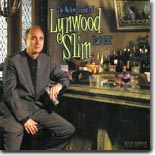 “Jazz
and Blues are just different fleas on the same dog.” This quote from the
liner notes on Lynwood Slim’s latest Delta Groove release says it
all. His latest project, Last Call, gives Slim the opportunity to
explore his jazz roots with some of the West Coast’s finest players. The
end result is very clear --- this dog can hunt!
“Jazz
and Blues are just different fleas on the same dog.” This quote from the
liner notes on Lynwood Slim’s latest Delta Groove release says it
all. His latest project, Last Call, gives Slim the opportunity to
explore his jazz roots with some of the West Coast’s finest players. The
end result is very clear --- this dog can hunt!
Kid Ramos opens up the show with his jump guitar solo on "Well Allright,
O.K. You Win." Slim blows a mean Hohner 64 Chromatic while intoning that
all he needs from his girl is “to just love me like I love you.” "All
Night Long" continues this theme of unrequited love while featuring Rich
DelGrosso on the mandolin. “Let me love you, love you…..I want to love
you baby one time before I go.” Kirk Fletcher kicks in with a supporting
guitar solo and we’re never clear if Slim gets the girl or not.
Things slow down a bit on "Wee Baby Blues." Supporting horns by Ron
Dziubla give this a classic jazz feel and I feel like I’m transported
back in time to one of the great jazz clubs of our era. “Go away baby,
yes, you sure look good to me….tell me pretty baby, who can your brand
new lover be?” Slim doesn’t get the girl but he was definitely in love
with her. He then proceeds to let us know he’s changing his ways on ‘I’m
Tired’. He’s tired of living all alone, partying by himself, staying up
late. The solution? “I’ll find myself a lover and never more be blue.”
We find Slim down and out on "Nothin But the Blues." “Ain't got no
coffee that’s perking….ain't got no women to lose…ain't got a dream
that’s working….I ain't got nothing but the blues.” All because his
baby’s left town. "You’re a Pain" finds Slim in love again and willing
to make compromises with his new love. “You’re a pain pretty baby…that’s
part of your charm…I love you pretty baby…if you’re right or if you’re
wrong.” Carl Sonny Leyland lends his keyboard talents to "You’re a Pain"
and Tyler Pedersen kicks in with some upright bass that gives this song
a very authentic jazzy feel.
"Say It" finds Slim backed by Armando Cortez on guitar, Nick Moss on
bass and Kate Moss on rhythm guitar. Cortez’s blistering guitar work
gives this song the strongest blues representation on the record. Slim
wants his girl to be true to herself and not be afraid to vocalize her
feelings. “I know to tell the truth sometimes it hurts…it would even
make you feel like dirt…but if there’s anything…anything you want to
tell me why don’t you ‘Say It’… even if it hurts me.” "Me, Myself & I"
finds Slim still in love with his girl. “Me, myself & I are all in love
with you….we all think you’re wonderful…we do!”
Slim is leaving the country in "Across the Sea," an original composed in
part by Kid Ramos. “I’m going to move across the sea….they got some work
over there for me….everything will be okay as long as my baby comes with
me….if she doesn’t want to come…I’ll never lack for misery.” Slim’s
soulful harmonica lets you know how much pain he will feel if his woman
decides not to go. “I treat you like a queen…you just couldn’t care
less…I’m not your clown….I don’t wanna be your clown…got to find
somebody else!” Slim lets his girl know in "Not Your Clown" that he’s
had enough. He tried every which way to please her and it just wouldn’t
work out. It’s time for him to move on and she can find a new clown.
Ron Dziubla is back with supporting horns and piano on "I’m Sorry." Slim
has evidently been mean to his woman and is trying his best to apologize
for his bad behavior. “Forgive me…please forgive me…baby please forgive
me….for I know not what I was saying.” While it’s never clear if she
forgives Slim, his angst at being wrong is very real. Closing out the
record is the Richard Duran original, "You Never Cried for Me." Slim’s
woman has had enough of his act and moved on. He’s disappointed that she
evidently never loved him as much as he loved her. Slim’s flute solo
underscores the pain he’s feeling and his disappointment at the fact
that his lover…”never cried for me.” Done as a slow shuffle, this is a
wonderful song to close out a very contemporary record.
I found Slim’s venture back to his jazz and blues roots a very
refreshing record. His ability to croon a jazz song with the best of
them is very apparent and he’s backed by a wonderful group of musicians,
including Kid Ramos, Ron Dziubla, Richard Innes, John Bazz and others.
Last Call does hold true to its premise that “jazz and blues are
different fleas on the same dog.” We’re fortunate that Slim managed to
scratch the ears of a very delightful dog.
--- Kyle Deibler
When one thinks of the blues and where the next fine sounding Delta
style musician will hail from, Australia doesn’t usually enter in the
mind. But now blues lovers of all kinds can add the name of Richie
Pavledis to their list of artists to keep an eye and ear on. Just
take a listen to Pavledis’s release from 2004 (ya I know, a bit slow on
the review), Live At The Charles, recorded live at the Australian
blues fave club, the Perth Blues Club at the Charles Hotel (hence the
title) where you’ll find a wonderful mix of classics and original tunes
laid down perfectly by Pavledis accompanying himself with only guitar
and harp.
Pavledis is something of a blues icon in his adopted homeland of
Australia (Palvedis was originally born in England and moved to
Australia in his teens), where in 2001 he was awarded the best blues
song at the annual WAMI (West Australian Music Industry) awards show
with his tune “Long Distance Dream” from the CD of the same name.
Before venturing out on a solo career Pavledis played with the best
blues artists the Down Under could manufacture, including that great
slide guitarist, Dave Hole. After experimenting with various blues-based
outfits, Pavledis decided to record the sounds that were forming in his
head. Every trip to the studio Pavledis usually came armed with the
finest musicians around to help make his musical visions become reality,
releasing Long Distance Dream in 2001 and Minstrel in
2002.
On Live At The Charles Pavledis does all the Delta musicians
proud by his expert vocals and picking on such timeless songs like
Robert Johnson’s “Last Fair Deal” and Wille Dixon’s “Spoonful.” He
accomplishes this by taking the true Delta style and incorporating his
own unique version, even coming up with a couple of original tunes like
“Mister River” and “I Became…” I have a feeling that someday these songs
may become classics as well. If you desire your blues stripped down and
pure, then check out Richie Pavledis at his
website to
learn more about the artist and his music.
Enjoy.
--- Bruce Coen
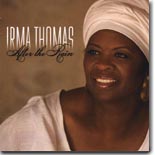 It's been six long years since Irma Thomas' last studio release (My
Heart's In Memphis - The Songs of Dan Penn), and this new release,
After The Rain (Rounder), stylistically follows in that one's
footsteps. It is a mostly poignant release whose tracks were chosen
before Katrina destroyed her's and so many other's homes. At first it
was rumored that Irma was missing, but luckily she was gigging in
Austin, and missed the destruction. This release also coincides with the
twin landmarks of her 65th birthday and her 20th anniversary with
Rounder Records.
It's been six long years since Irma Thomas' last studio release (My
Heart's In Memphis - The Songs of Dan Penn), and this new release,
After The Rain (Rounder), stylistically follows in that one's
footsteps. It is a mostly poignant release whose tracks were chosen
before Katrina destroyed her's and so many other's homes. At first it
was rumored that Irma was missing, but luckily she was gigging in
Austin, and missed the destruction. This release also coincides with the
twin landmarks of her 65th birthday and her 20th anniversary with
Rounder Records.
The CD opens with a beautiful reading of Arthur Alexander's "In The
Middle Of It All," setting the tone for the rest of the album that
follows. There are two Cajun style songs "Flowers" and "Another Lonely
Heart" both replete with some fine fiddling by Dirk Powell.
There are wonderful takes on the old Drifters song "I Count The Tears,"
Nina Simone's "I Wish I New How It Would Feel To Be Free" and Ray
Charles' cover of "Till I Can't Take It Anymore," which he recorded
during his Country & Western phase. Album favorites of mine are the
traditional songs "Make Me A Pallet On your Floor" and Blind Willie
Johnson's "Soul Of A Man" with Corey Harris on acoustic guitar.
There's a fine reading of Stevie Wonder's "Shelter In The Rain" with
just Irma and David Torkanowsky on piano. "Stone Survivor" has some nice
slide guitar by Sonny Landreth.
Perhaps the highlight of this release is the recently updated "Another
Man Done Gone" with such relevant lyrics as: "another man done gone ...
the waters at his door ... he couldn't stay no more." This song was
reportedly the only one selected for this release after Katrina hit.
Chalk up another very classy Irma Thomas release and one of her best
under the Rounder imprint. I think even the fans that thought her last
was a bit too low key will find a lot to love here. I did, but then I
have always loved Irma's entire output. It'll make my year's top ten for
sure.
--- Alan Shutro
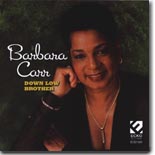 I'm so happy to see that Barbara Carr has returned to Ecko
Records after a couple of less than stellar releases for other
companies. Down Low Brother is the seventh release on Ecko
including one 'Best Of' CD. It is filled with so many good new tracks it
could almost be 'Best Of, ... Volume 2.' The house songwriting team of
Moore and Ward have given this new release numerous catchy tunes with
lots of hooks.
I'm so happy to see that Barbara Carr has returned to Ecko
Records after a couple of less than stellar releases for other
companies. Down Low Brother is the seventh release on Ecko
including one 'Best Of' CD. It is filled with so many good new tracks it
could almost be 'Best Of, ... Volume 2.' The house songwriting team of
Moore and Ward have given this new release numerous catchy tunes with
lots of hooks.
Barbara always had those memorable ("Bone Me Like You Own Me") and
lengthy ("If The Lord Keeps The Thought Of You Out Of My Head, I'll Keep
Your Booty Out Of My Bed") tunes on each album, and this release is no
exception. This time it's "You Gonna Mess Around and Get Bit By My Dog
Trying To Get To My Cat." It features some hilarious bow wow background
vocals, and oh yes, Barbara's dog stands 6-4.
The opening track, "You've Got To Right The Wrong," is a bouncy tune
that will do well in the clubs. "Down Low Brother" is a first cousin to
Peggy Scott-Adams' "Bill", a tune about her man leaving her for another
man. Poor Barbara, she caught her man too doing the very same thing.
"When You're Cheatin" is this release's obligatory cheating song.
With a few party songs and a touch more of real instruments than is
usually present on her releases and, as I previously stated,
well-written songs, this is a particularly strong outing for the "Bone
Me" woman. If you've enjoyed her earlier releases, this one will surely
please. If you don't know Barbara Carr's work, by all means get
acquainted. This one's a winner. Welcome back home.
--- Alan Shutro